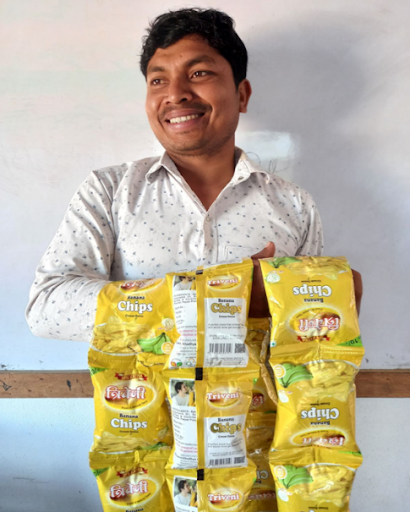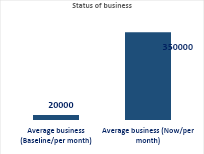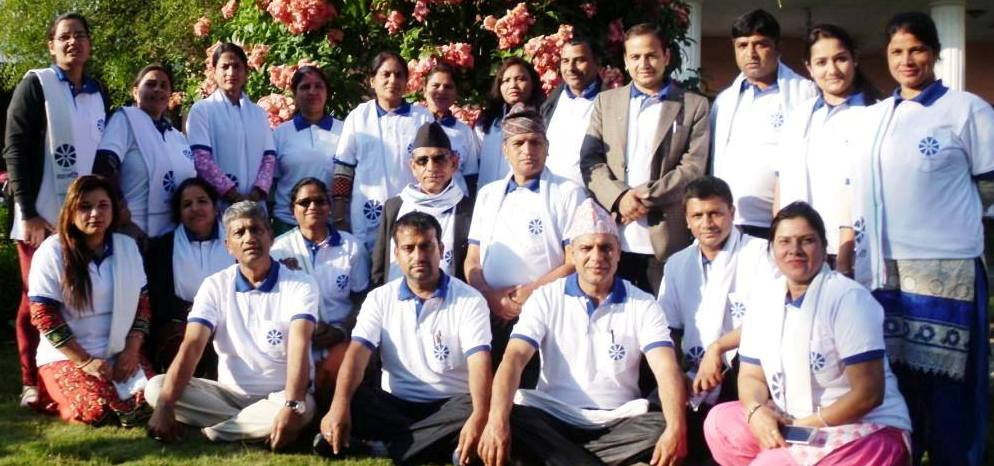Categories:

Location:
Gaindakot-5, Nawalparasi (Ba.Sa.Pu), Nepal


The Journey of a Struggling Worker to Entrepreneur


The inspiring story of Manubar Miya from Susta Village, Nawalparasi
Understanding and navigating the different phases of life made Manubar Miya stronger mentally and eventually a successful entrepreneur. This case study explores the journey of a 32-year-old first child of Alham Miya and Rahisum Nesa, who faced many challenges at the beginning but eventually found success through proper training and skill development.
Key Achievements:
Employment creation: 8 youths
Promoted entrepreneurs: 15 youths
Loan access: NPR 500,000
Agreements with wholesalers/private sectors: 2
Budget leveraged in kind: NPR 600,000
Manubar comes from an agricultural background and has two brothers. In 2010, his father had a loan of NPR 600,000. At that time, he was studying for his B.Ed. while working as the principal of Madrasa Gausia Ahlesunt, earning a monthly salary of NPR 3,700, which barely covered his education expenses. In January 2012, he got married, further increasing his family’s debt burden.
To manage expenses, he decided to go abroad. After several interviews and searching for manpower agencies in Butwal and Kathmandu, he received a visa for Saudi Arabia in 2014, paying NPR 200,000 to manpower. He started as a helper, later becoming an assistant operator, and earned NPR 36,000 per month. Over 5 years, he managed to clear his debts and save some money.
However, the COVID-19 pandemic in 2019 affected his job. His salary decreased, and eventually, he was terminated and sent back to Nepal in October 2019. Back home, he was uncertain about what to do next. Discouraged by his friend’s loss in cattle rearing, he avoided that sector. His father suggested fish farming, but due to a lack of knowledge, he hesitated. Later, he decided to try Dalmoth production, receiving training in Dalmoth and chip-making from Maharajganj, India. With an initial investment of NPR 300,000, he started his business.
Unfortunately, he struggled with market collection and faced daily losses, forcing him to close the business for six months. Determined to try again, he took an additional loan of NPR 500,000 and restarted, this time focusing on ingredients and quality. He actively sought training programs to strengthen his knowledge.
At first, he still lacked proper skills and modern technology for food processing. His family, seeing no profit, discouraged him, and he went through a financial crisis for the first two years.

“I now earn a net income of NPR 120,000 per month, with total sales reaching NPR 350,000 monthly. I personally market my products in Butwal, Parasi, Mahespur, Gopigunj, and other local markets. Alongside this, I cultivate bananas on 0.5 ha and have supported 15 entrepreneurs in peanut and banana farming by providing seeds and fertilizers. I buy their products at higher prices than the market rate. All the success I have today would not have been possible without the help and motivation from LWR/SAHAMATI and its programs,” reflects Manubar Miya with pride.
With persistence, he successfully established and registered his business as Triveni Food Industry, producing Dalmoth, banana chips, peanuts, popcorn, dhungri, and dry noodles. He upgraded his production and packaging by purchasing different machines. However, government officials instructed him to comply with food packaging standards and improve branding.
Initially, he struggled to get support, but through the Disaster Resilient Youth and Women Entrepreneurship Project implemented by SAHAMATI/LWR, he received assistance for printing and purchasing quality food wrappers. This helped him re-enter the market with stronger branding.
In addition, with project facilitation, he purchased de-oiling and nitrogen filling machines with 50% support from the Small and Domestic Industry Office. These improvements significantly increased product demand. His banana and potato chips became the most popular products, leading him to expand production.
Today, the company’s capital has grown to nearly NPR 4 million, with a bank balance of NPR 800,000 and NPR 700,000 receivables from the market. Although he faced setbacks and frustration, Manubar never lost hope.
Due to rising demand and agreements with wholesalers in Bhairahawa, his industry now operates in two shifts, employing 8 youths (4 in the day and 4 at night) since February 2024. Looking ahead, he plans to expand the company’s capital to NPR 10 million and build a new house with his savings.

Donors
Who Help Us


Everyone can help!
Donate
Donate